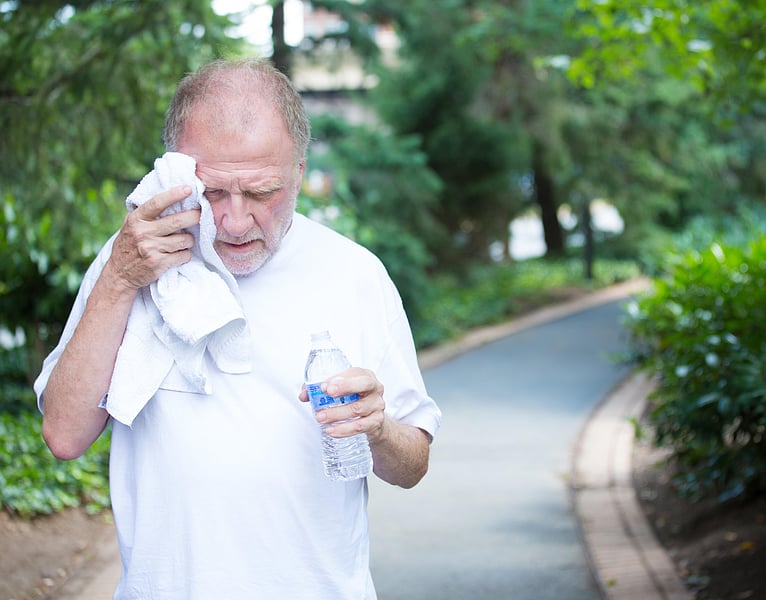Get Healthy!

- Cara Murez
- Posted July 11, 2023
Triple-Digit Heat Wave a Danger to Those With Dementia
As extreme heat continues to blanket numerous parts of the United States, Americans with dementia may be particularly challenged.
"Triple-digit temperatures and heat indexes are especially dangerous for someone with a dementia-related illness such as Alzheimer's disease, because the effects of dementia can impair their ability to notice if they are developing heat stroke or dehydration,"said Jennifer Reeder, director of educational and social services for the Alzheimer's Foundation of America.
"Taking a few simple steps will go a long way to help caregivers keep their loved one with dementia safe during the heat wave,"Reeder said in a foundation news release.
Watch out for wandering, a common behavior in individuals with dementia. They can become lost or disoriented and not know whom to call for help. This can be a particularly concerning behavior during a heat wave because in extreme heat conditions heat stroke can develop within minutes.
A way to reduce the chances of wandering is to help someone feel purposeful indoors, while also reducing excessive stimuli and ensuring basic needs are met.
Create walking paths around the home with visual cues and stimulating objects. Help the person stay engaged with simple tasks or activities such as music, crafts and games.
Just in case your loved one still does wander, be sure you have recent photo and medical information close at hand to provide to emergency responders. Also keep a list of familiar destinations that someone might try to wander to.
Hydration is also important. Alzheimer's disease can affect someone's ability to know when they're thirsty, so monitor fluid intake and encourage the person to drink frequently. Avoid alcohol and caffeinated beverages, which can contribute to dehydration.
Watch for heat stroke warning signs. They include excessive sweating, exhaustion, muscle cramps, rapid pulse, headaches, dizziness, nausea, sudden changes in mental status, or hot, dry or red skin.
If your loved one is showing the signs of heat stroke, you can help them to an air-conditioned room, remove clothing, apply cold compresses and provide fluids to help cool down their body. If the person faints, exhibits excessive confusion or is unconscious, call 911 immediately, the foundation advises.
Know where to cool down if you or your loved one does not have air conditioning.
Some cities open air-conditioned "cooling centers"during heat waves. These may be offered in senior centers, libraries, community centers and other municipal/public buildings.
Plan ahead for other issues that can happen during heat waves, such as blackouts and power failures. Keep cellphones, tablets and other electrical devices fully charged. Keep flashlights where you can easily grab them. Also keep a list of easily accessible emergency contact numbers for local utility providers, police and fire departments.
If you don't live near your loved ones, arrange in advance for someone nearby to check on them. Make sure this helper has information on emergency contacts and knows where your loved one keeps important medical information, such as an insurance card. Through this helper, make sure your loved one has plenty of water, and has access to air conditioning or other cooling.
The Alzheimer's Foundation has a helpline run by licensed social workers seven days a week. You can call 866-232-8484, text at 646-586-5283 or webchat at www.alzfdn.org.
More information
The U.S. National Weather Service has more on heat waves.
SOURCE: Alzheimer's Foundation of America, news release, July 10, 2023






